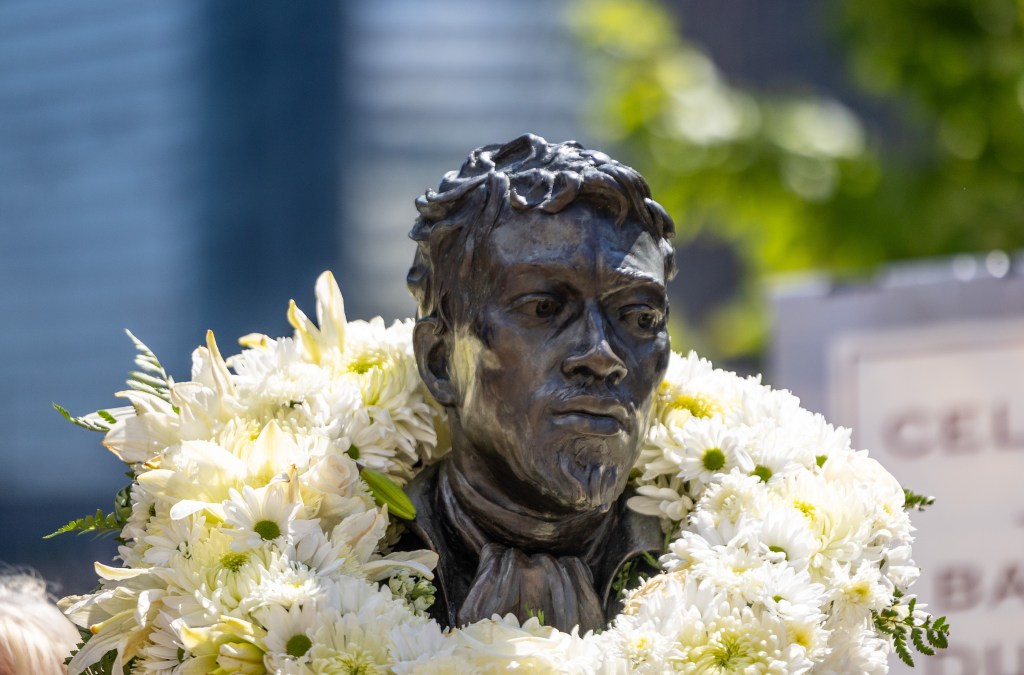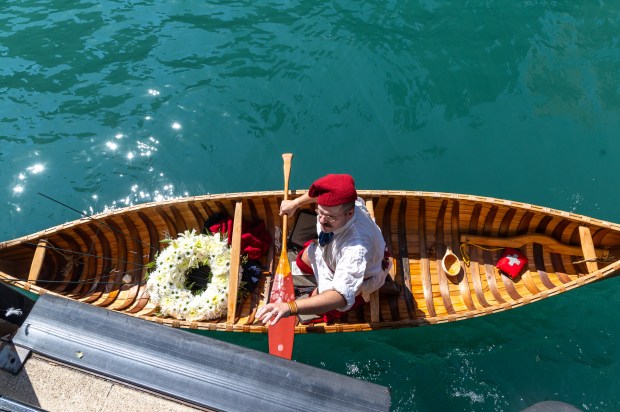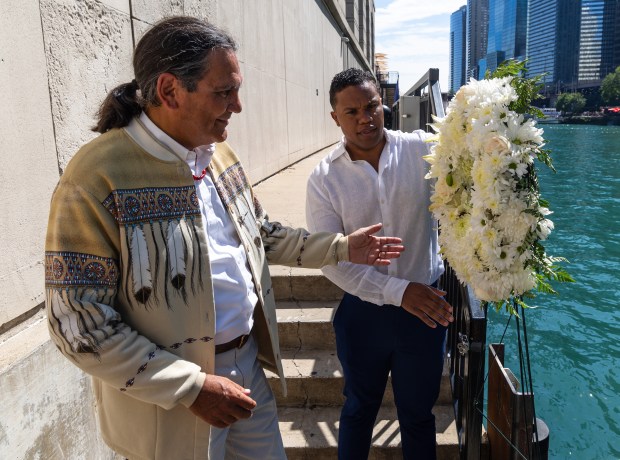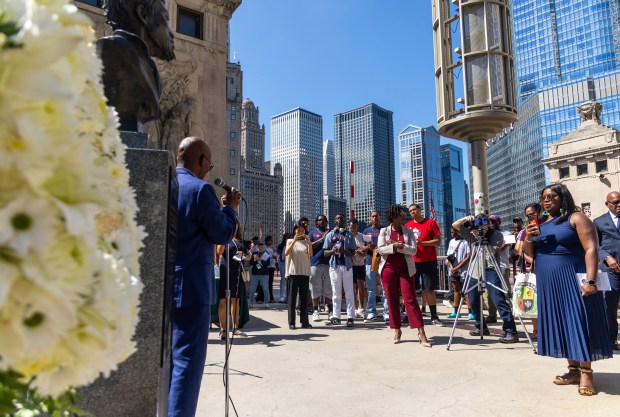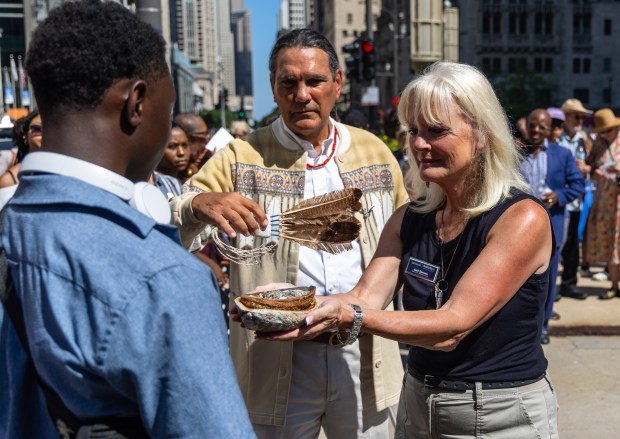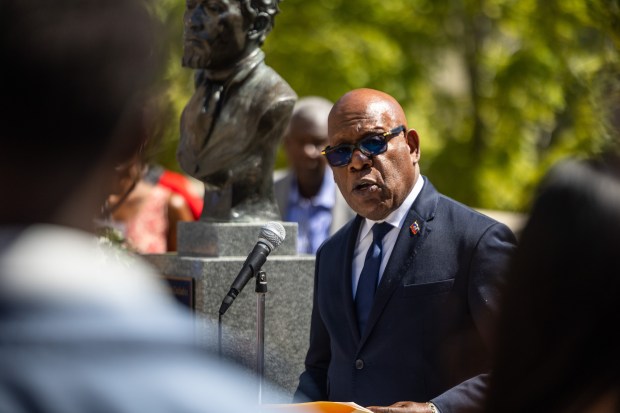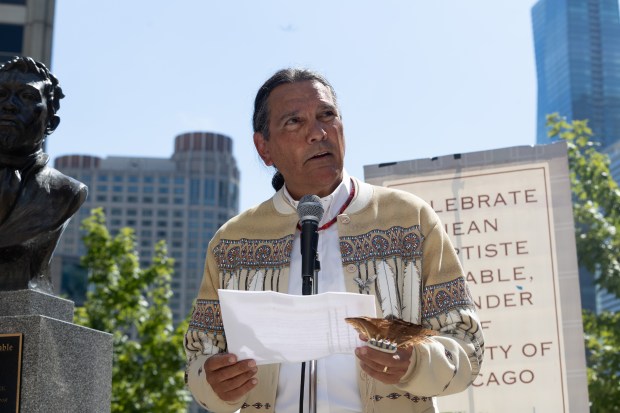With a garland of white flowers in front of him, a lone rower kneeling in a wooden canoe glided toward the DuSable Bridge docks. After stilling his vessel, two men on the Riverwalk helped him hoist the wreath onshore.
The two men, members of the DuSable Heritage Association and Native American Chamber of Commerce of Illinois, carried it up to the bronze bust of Jean Baptiste Point DuSable at the northeast corner of the bridge to the sound of Algonquin and Muskegon-Creek flute music.
The ceremony was meant to symbolize how DuSable, a Black man likely from the Caribbean who founded the settlement that would become Chicago, might have first arrived in the area, according to Rilck Noel, a board member of the DuSable Heritage Association.
Show Caption
1 of 7
Ald. David Moore, 17th Ward, fixes a wreath that was placed on a bust of Jean Baptiste Point DuSable during a ceremony honoring him that was hosted by the DuSable Heritage Association, Aug. 23, 2025, at DuSable Bridge in Chicago’s Loop. DuSable founded Chicago and was the first non-native resident to settle in the area. (Dominic Di Palermo/ Chicago Tribune)
“Everything is close to the water because of the need to have access to the different trade routes coming in,” Noel said. “That’s why we have the wreath coming in from the river — symbolizing how Chicago started.”
On Saturday, the DuSable Heritage Association, government officials and other community members gathered in Pioneer Court to commemorate DuSable, Chicago’s first non-indigenous permanent settler. This week marks the 207th anniversary of his death.
In addition to remembering Chicago’s past, Saturday’s ceremony helped celebrate the city’s multicultural present, Noel said.
“It’s preservation and awareness of what DuSable and immigrants in general represent for Chicago, the Midwest and the nation as a whole,” said Noel, who came to Chicago from Haiti in the 1970s as a student.
The consul general of Haiti in Chicago, Jean Joseph Leandre, and Ald. David Moore, 17th, also thanked local organizations and Chicago’s Haitian community for spreading awareness about DuSable’s significance. Moore was one of the City Council members who pushed for Chicago to rename Lake Shore Drive to DuSable Lake Shore Drive in 2021.
Speakers also stressed the importance of constructing DuSable Park. In 1987, then-Mayor Harold Washington dedicated land on the north shore of the Chicago River where it meets Lake Michigan for the park.
The park is nearing the end of its design stage, said Heather Gleason, the Chicago Park District’s planning and construction director. She said the groundbreaking will likely take place in March.
“This park will not only honor Chicago’s diversity, but provide a vital green space,” said Troy McMillan, a board member for Friends of the Parks. The nonprofit has been working with the DuSable Heritage Association and Chicago officials on the DuSable Park project.
Chicago’s founding family
While historians are still looking for crucial documentation about DuSable’s life, they generally agree he was born in Haiti during the 1740s. When he was about 25, he left home to settle in what is now the American Midwest, then under the control of the French.
DuSable married a Potowatomi woman named Kitihawa and often collaborated with the area’s Indigenous people, said Lake Forest College professor Courtney Joseph, who studies African American history. DuSable benefited from his close relationship with Indigenous people already living in the area, Joseph added while giving a walking tour along the Chicago River after the official commemoration.
DuSable traversed the Midwest as a trader and diplomat, establishing settlements in what’s now Michigan. At one point, he was captured by the British on suspicion of being a Patriot sympathizer during the American Revolution. After 10 to 20 years working and raising a family in his home — which historians estimate to be where the Tribune Tower now stands, according to Joseph — DuSable left in 1800 for present-day Missouri for some unknown reason. He died on Aug. 28, 1818.
After his death, DuSable’s name faded into obscurity until Black advocates in 1930s Chicago started pushing for his recognition. In the following decades, his name slowly made its way onto several public institutions — starting with DuSable High School in 1935.
A more recent initiative to adopt the Chicago founder’s name is the University of Illinois Chicago’s DuSable Scholars Program, which supports Black students underrepresented in the science, technology, engineering and math fields.
Maame Poku, a biochemistry student in the UIC DuSable program, said it was nice to see members of the Chicago community learning about DuSable’s legacy and supporting the heritage association’s work.
“It shows that people of color and immigrants are able to do things that are big and that can affect a whole population and community,” she said.
Poku also said after attending Saturday’s celebration that she wants to keep up with how DuSable Park is developing and is excited for “how nice it’s going to look.”
Chicago’s dominant historical narrative has often excluded people of color, Joseph said as she gestured during her tour to a plaque on DuSable Bridge dedicated to the first white men who passed through to the Chicago River. The two French explorers, Louis Jolliet and Jacques Marquette, were only temporary passersby, Joseph added.
Conversely, celebrating and learning about DuSable’s life shows how Chicago can be a city for all people, Joseph said.
“He’s important to us,” Joseph said. “How do we really know our history if we erase people like DuSable?”
Originally Published: August 23, 2025 at 3:03 PM CDT
